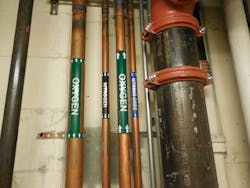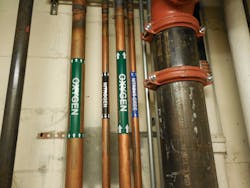Based on the 2020 NEC.
It is quite common for me to see multiple separately derived systems, such as several transformers in an electrical room, connected to a common grounding electrode conductor (GEC) using taps as specified in Sec. 250.30(A)(6), rather than seeing an individual GEC run for each transformer. This is a very common type of installation because it can be quicker, easier, and less expensive than installing an individual GEC for each transformer. However, I think some clarification is needed on exactly which piping systems need to be bonded to this common GEC.
The present wording in Sec. 250.104(D)(3) requires all interior metal piping in the area served by the separately derived system to be bonded to the common GEC — regardless of what type of metal piping it is and regardless of whether the metal piping is considered “likely to becoming energized” or not. And yet, several other Sections in the Code [including Sec. 250.104(A)(1), (2), and (3), and Sec. 250.104(D)(1)] require only the water piping to be bonded regardless of whether it is “likely to become energized” or not. Section 250.104(B) requires other metal piping systems to be bonded only if the piping is “likely to become energized.” Yet, for some reason, the present wording in Sec. 250.104(D)(3) requires bonding of ALL metal piping including water piping, gas piping, compressed air piping, piping for oxygen systems, nitrogen systems, nitrous oxide systems, vacuum lines, medical air piping, exhaust pipes, drain pipes, sewer pipes, oil pipes, fuel pipes, and so on, regardless of whether these piping systems are “likely to become energized” or not. The text in Sec. 250.104(D) and the exception in Sec. 250.104(D)(3) may provide some clues that the intent of Sec. 250.104(D)(3) may be to require only metal water piping to be bonded to the common GEC, since they both use the words “water piping” while Sec. 250.104(D)(3) does not.
I believe this may be a simple error of omission that has been overlooked for quite some time. I really can't imagine any good reason to require bonding of drain pipes, sewer pipes, or any other metal pipes that are not likely to become energized. Perhaps the 2023 Code will provide some clarification on these bonding requirements. For now, I suggest having a conversation with your AHJ to try and decipher these rules.
About the Author

Russ LeBlanc
Owner
Russ started in the electrical trade as an apprentice in 1985. He worked his way up to become a Journeyman Electrician and then eventually became a Master Electrician and Licensed Construction Supervisor. In 1999 Russ become an Electrical Instructor for The Peterson School of Engineering in Massachusetts where he developed his passion for teaching, and quickly became Department Head of Electrical Instruction. Russ has taught thousands of apprentices, electricians, engineers, inspectors, and other electrical professionals during his career as an instructor. He continues to provide electrical professionals with Electrical Code seminars, Arc-Flash Awareness training seminars and educational material through his LeBlanc Consulting Services in North Reading, MA whose specialty is educating electricians. He has been an active member of the NFPA Electrical Section and has authored hundreds of National Electrical Code proposals and comments which have become Code rules to improve the safety for the electrical industry. Russ is also an IAEI certified Electrical Inspector.
Please visit www.russleblanc.net for more information.

